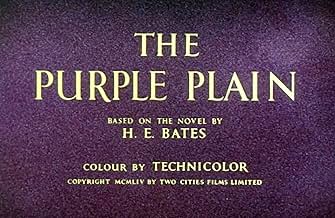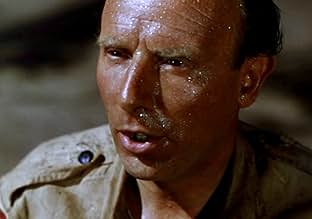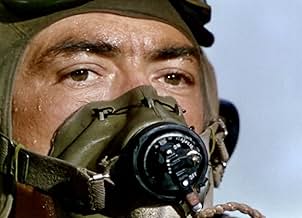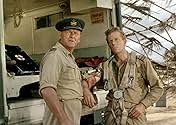AVALIAÇÃO DA IMDb
6,5/10
2,6 mil
SUA AVALIAÇÃO
Adicionar um enredo no seu idiomaIn World War II Burma, a Canadian bomber pilot becomes reckless after losing his bride in a Luftwaffe air raid.In World War II Burma, a Canadian bomber pilot becomes reckless after losing his bride in a Luftwaffe air raid.In World War II Burma, a Canadian bomber pilot becomes reckless after losing his bride in a Luftwaffe air raid.
- Indicado para 4 prêmios BAFTA
- 4 indicações no total
Brenda de Banzie
- Miss McNab
- (as Brenda De Banzie)
Dorothy Alison
- Nurse
- (não creditado)
Peter Arne
- Flight Lieutenant
- (não creditado)
Ernest Blyth
- Man Dancing at Wedding
- (não creditado)
Richard Duke
- Nightclub Patron on Dance Floor
- (não creditado)
Jack McNaughton
- Sgt. Ralph Brown
- (não creditado)
Lane Meddick
- Radio Operator
- (não creditado)
Harold Siddons
- Navigator Williams
- (não creditado)
Mya Mya Spencer
- Dorothy
- (não creditado)
- Direção
- Roteiristas
- Elenco e equipe completos
- Produção, bilheteria e muito mais no IMDbPro
Avaliações em destaque
A really fine film and quite remarkable especially for it's time; shot on location (Ceylon standing in for Burma) in color and with an actual Burmese woman for the female romantic lead. As a war film the pacing and lack of any real 'battle scenes' might disappoint a few people. But the film is at its core is a character study of a RAF pilot (Peck) who has 'gone round the bend' suffering from what we'd call PTSD today and how his battle with it consumes him as much as the war with the Japanese.
The other major character - other that the wonderful Win Min Than as the 'love interest' - is the location itself. 'Location as Charter' is something that David Lean latter became famous for but here in this film the immense expanse of jungle and plain becomes a beautiful but deadly antagonist The 'actual enemy', the Japanese Army, is tellingly, never seen.
As this is a British film all the performances (except for -shockingly- the one Scotswoman in the film) are nicely understated. At one point Peck's character admits that he has been trying to get himself killed in battle ever since the death of his wife to which he drolly adds ' you think that would be pretty easy in a war....but all they kept doing was giving me medals....' WWII airplane geeks ( guilty as charged) will appreciate the shots of the De Haviland Mosquitoes in operation.
The other major character - other that the wonderful Win Min Than as the 'love interest' - is the location itself. 'Location as Charter' is something that David Lean latter became famous for but here in this film the immense expanse of jungle and plain becomes a beautiful but deadly antagonist The 'actual enemy', the Japanese Army, is tellingly, never seen.
As this is a British film all the performances (except for -shockingly- the one Scotswoman in the film) are nicely understated. At one point Peck's character admits that he has been trying to get himself killed in battle ever since the death of his wife to which he drolly adds ' you think that would be pretty easy in a war....but all they kept doing was giving me medals....' WWII airplane geeks ( guilty as charged) will appreciate the shots of the De Haviland Mosquitoes in operation.
Purple Plain is an obscure film in Peck's long list of movie credits. I don't know if this British production got much publicity or release stateside, despite Peck's movie star celebrity. Unfortunately, it's never been a TV regular, which is too bad because this tale of renewal and survival is an unusual and gripping one, in spite of the obscurity.
The film opens in the Burmese jungle during WWII. Peck is a battle fatigued flyer on the ragged edge of breakdown. He's about to be relieved because of erratic behavior, all the while he's flashing back on his wife's death in a London air-raid. These are well-done scenes causing us to sympathize with his loss. Nonetheless, he's jeopardizing his comrades with reckless manuevers because the loss has undermined his will-to-live. Thus, we're torn between sympathy and concern, just like the flight station doctor (Bernard Lee).
In an interesting move, Lee overcomes Peck's agonies by reconnecting him socially, in this case with a nearby missionary community. There Peck finds the vital human relationships so importantly missing from his death-dealing combat duties. As a result, his life takes on new meaning and purpose as a result of rejoining a human community where such life-giving affirmations can emerge. On the whole these are well-done scenes, especially the chaos from the Japanese air attack. In the midst of the carnage, Peck's combat flyer finds a new role in helping to bandage up survivors. Herein lies the movie's basic message and it's an important and humane one, conveyed in fairly subtle fashion, though the turn-around occurs more quickly than I would have liked.
Nonetheless, it's interesting that the script avoids the usual officially sanctioned head-doctor therapies. Note that Peck is not sent to be counseled by an air force psychiatrist, nor to join a chest-baring therapy group, nor to have his past puzzled together Freudian style. Of course, the happy solution here remains a "movie" solution where-- as we all know-- anything can be made to magically happen. Still, for a war-movie setting, the simple affirmation that mental health lies through nurturing social relations and not through government sanctioned killing remains no less suggestive because of its movie origins.
The remainder of the film amounts to a survival trek through the wilds of southeast Asia. It's a well-filmed and harrowing struggle against a forbidding landscape where the crash survivors must decide between staying put or hiking out against great odds. But most importantly, it's Peck's chance to regain his humanity by facing up to the odds, not just for his own survival, but for his two comrades as well. The movie's final scene could not have been better conceived. Indeed, no words are necessary. On the whole, this is a subtly and well thought out anti-war film, no less effective because it concerns the fate of one man rather than thousands.Too bad that its humane message remains so generally unseen.
The film opens in the Burmese jungle during WWII. Peck is a battle fatigued flyer on the ragged edge of breakdown. He's about to be relieved because of erratic behavior, all the while he's flashing back on his wife's death in a London air-raid. These are well-done scenes causing us to sympathize with his loss. Nonetheless, he's jeopardizing his comrades with reckless manuevers because the loss has undermined his will-to-live. Thus, we're torn between sympathy and concern, just like the flight station doctor (Bernard Lee).
In an interesting move, Lee overcomes Peck's agonies by reconnecting him socially, in this case with a nearby missionary community. There Peck finds the vital human relationships so importantly missing from his death-dealing combat duties. As a result, his life takes on new meaning and purpose as a result of rejoining a human community where such life-giving affirmations can emerge. On the whole these are well-done scenes, especially the chaos from the Japanese air attack. In the midst of the carnage, Peck's combat flyer finds a new role in helping to bandage up survivors. Herein lies the movie's basic message and it's an important and humane one, conveyed in fairly subtle fashion, though the turn-around occurs more quickly than I would have liked.
Nonetheless, it's interesting that the script avoids the usual officially sanctioned head-doctor therapies. Note that Peck is not sent to be counseled by an air force psychiatrist, nor to join a chest-baring therapy group, nor to have his past puzzled together Freudian style. Of course, the happy solution here remains a "movie" solution where-- as we all know-- anything can be made to magically happen. Still, for a war-movie setting, the simple affirmation that mental health lies through nurturing social relations and not through government sanctioned killing remains no less suggestive because of its movie origins.
The remainder of the film amounts to a survival trek through the wilds of southeast Asia. It's a well-filmed and harrowing struggle against a forbidding landscape where the crash survivors must decide between staying put or hiking out against great odds. But most importantly, it's Peck's chance to regain his humanity by facing up to the odds, not just for his own survival, but for his two comrades as well. The movie's final scene could not have been better conceived. Indeed, no words are necessary. On the whole, this is a subtly and well thought out anti-war film, no less effective because it concerns the fate of one man rather than thousands.Too bad that its humane message remains so generally unseen.
This well-produced and often-moving J. Arthur Rank production stars Gregory Peck as a Canadian flyer serving with the British in Burma, suicidally reckless after his wife's death in the Blitz, who finds new reason for living after meeting a beautiful Burmese girl. Then, however, his plane crashes in the wilderness behind Japanese lines and he has to find a way to get back home with his injured crewman and complaining passenger. It's beautifully shot, well-acted, and a powerful story of hope vs. Despair. Apparently, a popular hit in Britain, it doesn't seem to have made much of a mark in the U. S. but deserves to be much better known.
Peck is a neurotic, suicidal pilot in Burma during WWII. He's transformed by his love for a native girl, which gives him the drive to survive the trek through the harsh burmese wilderness after his plane crashes.
A good,dramatic film with serviceable performances by the cast. Especially by Brenda De Banzie as a missionary.
A good,dramatic film with serviceable performances by the cast. Especially by Brenda De Banzie as a missionary.
In every era of history where men are pitted against each other, there too great memories are lost and buried. As each loss is created, so too are the haunting images which etch across a soldier's face. Every man's countenance thereafter displays his loneliness and despair. Yet within his heart and soul is the yearning for redemption and another chance to live and love again. This movie called " The Purple Plain " is based on the novel written by H. E. Bates and is wonderfully directed by Robert Parrish. With the vast landscape of the Burmese jungle and it's idyllic locations, we have Bill Forester (Gregory Peck) a lost and war weary squadron leader, Bill Forrester (Gregory Peck) pushing his luck in an apparent attempt to commit suicide. Having lost his wife to the war, he now displays a reckless, carefree attitude boarding on the insane. However, those around him see a mutilated man racked by pain and despair, creating both fear and admiration. A doctor (Bernard Lee) is given a last chance to see if there anyway to save him. The film is a superb offering of Mr.Peck's great talent. In addition we see a great performances by Maurice Denham as Blore and Win Min Than as Anna. All in all, this film is one of the most overlooked milestones in cinematic history. ****
Você sabia?
- CuriosidadesWin Min Than's husband was so jealous about losing her to the film's "decadent" Hollywood star Gregory Peck, he ordered his wife to eat garlic before romantic scenes with Peck. Fortunately, the production crew was able to convince her husband that Peck and the others were respectful of her so he went home leaving her to finish the picture in peace.
- Erros de gravaçãoWhen Peck's co-pilot looks out at the starboard engine, it is leaking some kind of fluid, but that fluid is running down the side of the engine. It's not showing any sign of what would have to be, at least a 200 mph wind, passing over the nacelle.
- Citações
Anna: It's not good to die inside.
Squadron Leader Bill Forrester: It's like living a bad dream.
Anna: Here we bury the dead in the earth not in our hearts. Is the dream over now?
Squadron Leader Bill Forrester: I think so.
- Cenas durante ou pós-créditosOpening credits prologue: BURMA 1945
- ConexõesReferenced in Toon in with Me: On This Day... June 25th (2024)
Principais escolhas
Faça login para avaliar e ver a lista de recomendações personalizadas
- How long is The Purple Plain?Fornecido pela Alexa
Detalhes
Bilheteria
- Orçamento
- US$ 2.000.000 (estimativa)
- Tempo de duração
- 1 h 37 min(97 min)
- Cor
- Proporção
- 1.66 : 1
Contribua para esta página
Sugerir uma alteração ou adicionar conteúdo ausente


































